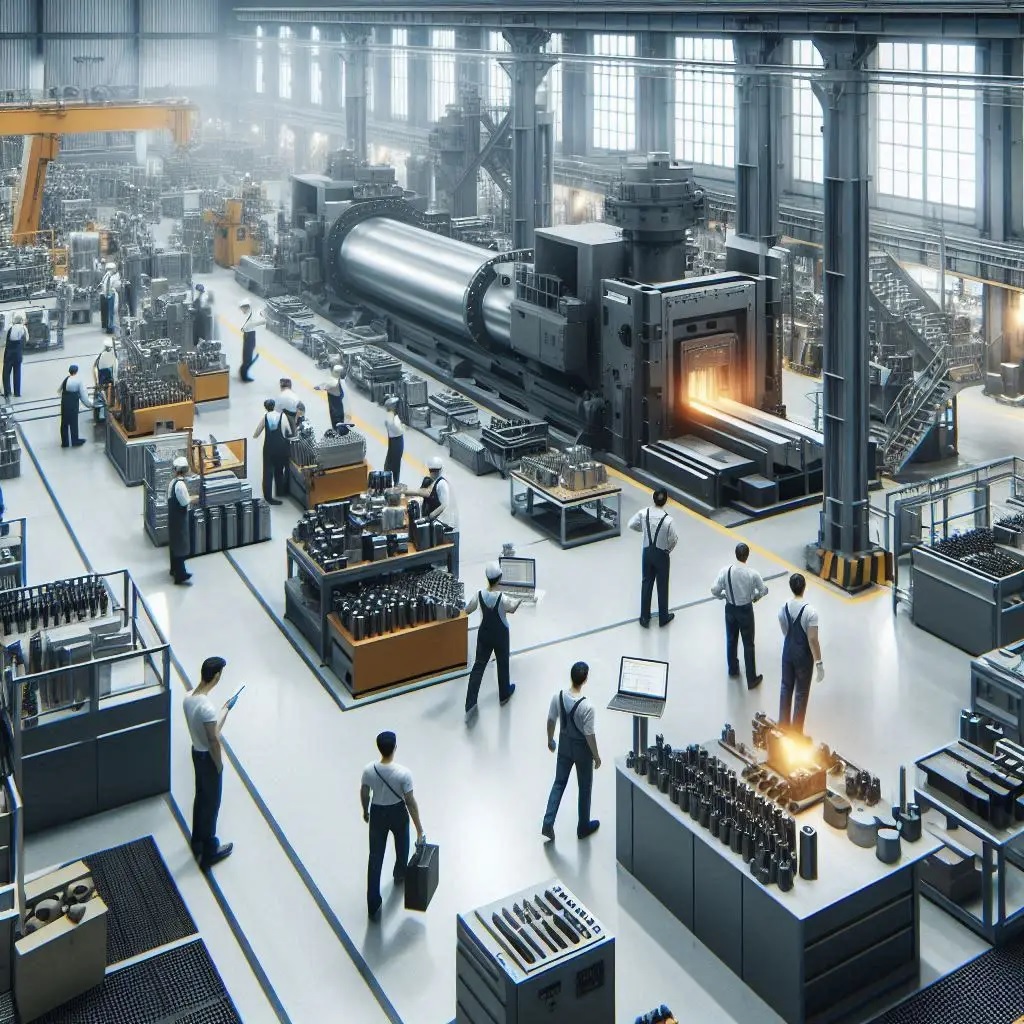Aluminum forging producers have an essential function in modern engineering and industrial production. As industries progressively require lightweight, high-strength, and corrosion-resistance components, aluminum forging has become the favored manufacturing technique for many occasions—from aerospace and automotive to power generation, marine, and heavy machinery.
Forging is a method of working with metals to form aluminum billets, under very high compressive forces, usually with the metal heated, into end parts that are strong, precise, and durable. Casting or machining does not refine the grain structure or mechanical properties of the metal. When metal is forged, the grain structure of the metal is refined and internal defects are removed in order to gain improved performance and reliability.
In today’s competitive environment, when used with a quality aluminum forging manufacturer you could have the assurance that component parts are manufactured to high industry standards for quality, strength and accuracy.
Why Use Aluminum for Forged Components?
Like other non-ferrous metals, aluminum is one of the most widely versatile and commonly used metals in industrial applications based on its unique and useful combination of low weight and excellent mechanical properties. Forging enhances mechanical properties (strength, toughness and fatigue) of aluminum to a significantly greater extent, therefore allowing it to be used in components that will be loaded substantially while in service. The aluminum’s favorable strength to weight ratio is particularly advantageous in automotive, aerospace and transportation applications in which weight is of critical concern to keep functional performance and maximize performance. In addition to the natural oxide layer, which is useful in preventing corrosion in harsh marine or chemical environments, it exhibits high thermal and electrical conductivity which is useful for generating power and electrical applications. On the other hand, aluminum is made of material that has no porosity to aid the rigidity and robustness of individual parts. Lastly, aluminum works can be fully recycled, which provides a positive contribution to sustainability while producing and manufacturing aluminum forgings.
The Aluminum Forging Process: Steps Involved
Top aluminum forgings manufacturers utilize innovative methods, robust processes and technologies to provide components to higher superior performance, strength and reliability. The forging process begins with the selection of high-quality aluminum alloys for the specific application, this may typically be 6061, 7075, 2024 or 5083 alloys depending on its strength, resistance to corrosion and effects of temperature on the alloy. The forging billets are heated to the appropriate forging temperature, typically between 400°C and 500°C, to allow the aluminum to yield into a ductile form while preserving its shape. The aluminum is in the form of the forging material and the forging process is accomplished by deforming the aluminum into shape under a very high-pressure force through hydraulic presses or mechanical hammers.
Depending on the size and complexity of the part, the almond would be forged using open-die, closed-die, or precision forging. After the forging process has occurred, a secondary heat-treating process occurs which will help develop the mechanical properties of the aluminum with respect to items such as tensile strength, toughness, and hardness.
Next, the forged part will then use precision CNC machining to ensure that the finished part has a correct dimensional accuracy and surface finish quality. Further, the part can be anodized for aesthetics and corrosion protection after CNC machining the forging. Finally, the part or component will experience a thorough quality assurance program that encompasses non-destructive testing and dimensional testing to guarantee that all parts satisfy both the specifications’ requirements and the customers’ requirements.
Essential Benefits of Forged Aluminum Parts
Forging aluminum parts offers many advantages over casting, machining, or fabrication, which is why it is the technology of choice for high performance parts. One of those benefits is mechanical properties. Parts produced through the forging process change the internal grain structure to improve the tensile strength, fatigue strength, and impact toughness of the material.This is especially valued when designing a part that will be loaded in safety critical applications. Also, it enables the design of parts to be more lightweight, while still providing excellent strength, which is important in the automotive, aerospace, and various transportation sectors, as all these industries focus even heavier on fuel efficiency and performance.
Top aluminum forging manufacturers make themselves unique by utilizing technology, practical engineering, and decades worth of industry know-how to specify components with the highest quality compliance to performance standards. They are effective through a strong materials knowledge as well as understanding a variety of aluminum alloys selected for good mechanical properties such as strength, durability, and corrosion resistance when implementing in applications. These manufacturers have expertise in advanced forging whether it is open-die forging, closed-die forging, impression-die forging, or ring forging to provide a variety of component complexity, size, and performance. Manufacturers also implement precision engineering to develop technologies like CNC machining, metallurgy, heat treatment, specialized finishing to provide specifications, tolerances, and good surface finishes per the requirements of mechanical engineers and manufacturers. Manufacturers that have quality certifications (such as ISO 9001, AS9100, IATF 16949) have gone through rigorous course of international standards in adhering quality. Manufacturers with good customization or design support capabilities can speak to collaborating on the design, prototyping the solution, and provide custom solutions based on customer needs within various industries.
Applications of Forged Aluminum Components Across Industries
Aluminum forgings are well-known and utilized in virtually every industry for their exceptional lightweight, strength and versatility properties. Leading aluminum forging companies produce aluminum components with precision that meet the functional and performance requirements of users in many industries. In the automotive industry, forged aluminum parts such as suspension arms, control arms, steering knuckles, brake calipers and components of transmissions reduce overall weight of the vehicle, increase fuel efficiency, and improve the safety of vehicle operation. In the aerospace industry, forgings are used for many applications including landing gear, structural frames, engine mounts and turbine components, and may be subjected to severe stress, temperature differentials and environmental conditions.
In the oil and gas industry, high pressure flanges, valves, fittings, pump housings and couplings are regarded to be more reliable against corrosion in difficult operating environments. The power industry and renewable energy sector utilizes forged turbine shafts, generator housings and structural support that take advantage of aluminum’s conductivity and strength in energy efficient systems. The marine and defense industries also utilize forgings in their operations such as propeller hubs and deck fittings that provide corrosion resistance, lightweight construction and durability to provide long-term use.
Essential Features of the Top Aluminum Forging Producers
Top aluminum forging producers distinguish themselves by utilizing state-of-the-art technology, expert engineering, and a depth of aluminum forging experience to manufacture parts that will satisfy the best standards of quality and performance in the industry. Their accomplishment derives from their overall knowledge of aluminum material and their specific comprehension of the aluminum alloys for intended purposes that must have optimal strength, durability, and corrosion resistance.These manufacturers have efficiently adapted to the advanced forging process, whether they open-die, closed-die, impression-die, or ring forge, because they can produce components of various size and complexity, all with specified performance requirements. By employing precision engineering, manufacturers employ CNC machining, heat treatment, and special finishes to necessary precisely engineered parts with tight tolerances and high quality surface finishes. Manufacturers that have implemented quality certificates, such as ISO 9001, AS9100, and IATF 16949 comply with international standards, which implies this quality is standardized. Manufacturers who provide specific customizations or design support services, may even claim to work collaboratively to design components, prototype, and provide custom solutions for unique project requests in several industries.
Selecting an Aluminum Forging Manufacturer
Whenever we need aluminum forged products we must consider some factors in mind. Choosing the right aluminum forging manufacturer is important, that is why we must choose manufacturers that have adequate industrial experience. A manufacturer who possesses the knowledge, experience, and capabilities to produce complex and quality forgings will minimize your risk, and enhance the performance of the product itself. Also, manufacturing capabilities from the partner – or having the ability to be flexible with regards to handling different sizes, volumes, and/or complexities – are crucial for scalable manufacturing and efficiency. A supplier that can deliver value-added engineering support will offer further value with collaborative design, rapid prototype development, and tailored engineering solutions based on requirements for specific applications. Finally, comprehensive after-sales support consisting of testing, maintenance, and lifecycles services enhance the ongoing reliability of the forged parts and performance in an industrial setting.
The Future of Aluminum Forging
Rising demand globally for strong, lightweight components is driving innovation into aluminum forging. Automation use, artificial intelligence driven quality control processes, and digital twins are all being embraced by manufacturers to improve precision, minimize waste, and efficiency. Sustainability initiatives- such as the use of recycled aluminum and energy saving forging technology- are also important in the context of the industry. As industries such as aerospace, electric vehicles (EVs), renewable energy, and defense become more advanced, it is clear the industry will continue growing in demand for forged aluminum parts.
Conclusion
These days, aluminum forging manufacturers are key partners in industry that afford light, strong, and dependable components to harness strength all industries from the emerging electric vehicle (EV) sector to aerospace, power generation, oil and gas, defense, and many others. The strength-to-weight ratio, mechanical properties, and corrosion resistance of forged aluminum components provide unprecedented capabilities for both performance and longevity.
Leading aluminum forging manufacturers utilize advanced forging techniques, precision engineering, and industry knowledge to pave the way for the future in engineering — developing solutions that support shifting needs of engineering and industry today. A trusted aluminum forging manufacturer is your partner in the future success of your long-term aerospace, automotive, military, and oil and gas components for energy and transportation in the future.
The demand for aluminum forgings will only accelerate as industries evolve in significant areas including aerospace, EV, renewable energy, and defense. Manufacturers of aluminum forging remain at the intersection of engineering and industry providing essential products that enable engineering, performance, and innovation throughout all performance sectors.


